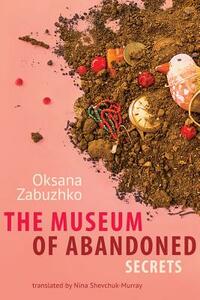Take a photo of a barcode or cover
This review can be found at www.ifithaswords.blogspot.com and Amazon.com as part of the Vine program.
Came for the insights into Ukrainian history, culture and life – what I got was what feels like an endlessly meandering one-person podcast about mostly mundane things with glimpses of striking clarity here and there.
Don't get me wrong – there is some VERY interesting, downright enlightening stuff in these monologues. You just need to find the gold between hundreds of lines. It's not merely a factor of value-for-time. I just didn't feel engaged by this novel at all. Which is weird.
Because the prose itself is amazing. This author knows how to create some amazing images and allegories through sentences that bite. When this novel hits you, it leaves a mark. How can it be then that the vast majority of what is written here feels monotonous as heck and seemingly goes nowhere?
One of the reasons might be that this novel feels like it is first and foremost about... well, just being an average woman first and foremost. Don't get me wrong, the world still needs way more literature about just "being a woman" (whatever that may entail). In this specific case, however, this rather mundane aspect steals far too much of the spotlight from the historical bits that the blurb on the back of the book promises. You may find the Holodomor, the Nazi occupation, the Soviet era, the Orange Revolution and so on right in here somewhere... But yes, you will need to dive in there and FIND it.
Don't get me wrong – there is some VERY interesting, downright enlightening stuff in these monologues. You just need to find the gold between hundreds of lines. It's not merely a factor of value-for-time. I just didn't feel engaged by this novel at all. Which is weird.
Because the prose itself is amazing. This author knows how to create some amazing images and allegories through sentences that bite. When this novel hits you, it leaves a mark. How can it be then that the vast majority of what is written here feels monotonous as heck and seemingly goes nowhere?
One of the reasons might be that this novel feels like it is first and foremost about... well, just being an average woman first and foremost. Don't get me wrong, the world still needs way more literature about just "being a woman" (whatever that may entail). In this specific case, however, this rather mundane aspect steals far too much of the spotlight from the historical bits that the blurb on the back of the book promises. You may find the Holodomor, the Nazi occupation, the Soviet era, the Orange Revolution and so on right in here somewhere... But yes, you will need to dive in there and FIND it.
I read this book for a course about Ukrainian literature and this was by far my favorite book of the semester. There is a lot to love about “The Museum of Abandoned Secrets” The plots you follow are engaging, the writing style is beautiful, and the ending provides a satisfying payoff. Each of the main characters are fleshed out and complex- the protagonists aren’t always likable but they’re always compelling.
Of course, “The Museum of Abandonment Secrets” is not perfect. The storyline follows multiple perspectives and can be a little confusing because the author tends to get into tangents. I’d recommend going in with a little context about Ukrainian History. But overall, this is one book you won’t regret reading!
Of course, “The Museum of Abandonment Secrets” is not perfect. The storyline follows multiple perspectives and can be a little confusing because the author tends to get into tangents. I’d recommend going in with a little context about Ukrainian History. But overall, this is one book you won’t regret reading!
challenging
informative
mysterious
reflective
sad
slow-paced
Plot or Character Driven:
Character
Strong character development:
Yes
Loveable characters:
Yes
Diverse cast of characters:
Yes
Flaws of characters a main focus:
No
I'm kind of obsessed with this book. This was NOT an easy read. I started reading it in April of last year, and like so many things, it got derailed. I decided to pick it back up in December, figuring I could finish it by the end of the year, but had to start over because I had no idea what was happening.
The first chapter of this book absolutely captivated me both times I read it. The musing about the narrator not really knowing her father and the description of Palace Ukraina just hit all my buttons of fascinating exploration of character while also giving me insight into Ukrainian history, which is why I picked up the book in the first place.
And then it abruptly shifts from first person narration including second person pronouns to third person in chapter 2, and it felt like gears suddenly thrown out of alignment. A good portion of the experience of reading this book was a sense of utter confusion about who the narrator was (since each chapter often shifts in time and/or first/third person) and whether what was happening was real. I stuck with it because the *words* that were used in the writing itself were truly phenomenal, I have highlighted the Kindle copy of this book more than I think I've done, particularly for a fiction story, maybe ever. And I'm so so so glad I stuck with it because around 70% of the way through, it all starts to coalesce into focus and all of the confusion melts away and the ending makes it all worth it.
I definitely struggled in particular with my unfamiliarity with the names in this story, because I think I would have drawn connections and patterns more rapidly if I had more context, but what an extraordinary job this translator has done. I deeply wish that I could magically gain not just the language knowledge but also the cultural knowledge to read this book in Ukrainian so that I could really appreciate its full impact, but, I still really really enjoyed it and gained much more understanding of Ukrainian history than I had before reading it.
The first chapter of this book absolutely captivated me both times I read it. The musing about the narrator not really knowing her father and the description of Palace Ukraina just hit all my buttons of fascinating exploration of character while also giving me insight into Ukrainian history, which is why I picked up the book in the first place.
And then it abruptly shifts from first person narration including second person pronouns to third person in chapter 2, and it felt like gears suddenly thrown out of alignment. A good portion of the experience of reading this book was a sense of utter confusion about who the narrator was (since each chapter often shifts in time and/or first/third person) and whether what was happening was real. I stuck with it because the *words* that were used in the writing itself were truly phenomenal, I have highlighted the Kindle copy of this book more than I think I've done, particularly for a fiction story, maybe ever. And I'm so so so glad I stuck with it because around 70% of the way through, it all starts to coalesce into focus and all of the confusion melts away and the ending makes it all worth it.
I definitely struggled in particular with my unfamiliarity with the names in this story, because I think I would have drawn connections and patterns more rapidly if I had more context, but what an extraordinary job this translator has done. I deeply wish that I could magically gain not just the language knowledge but also the cultural knowledge to read this book in Ukrainian so that I could really appreciate its full impact, but, I still really really enjoyed it and gained much more understanding of Ukrainian history than I had before reading it.
adventurous
challenging
dark
emotional
hopeful
mysterious
reflective
sad
slow-paced
Plot or Character Driven:
A mix
Strong character development:
Yes
Loveable characters:
Yes
Diverse cast of characters:
Yes
Flaws of characters a main focus:
Complicated
That was a really dense and intense read. Gave me beautiful glimpses of Ukrainian culture and history. Loved the stream of consciousness narrative style.
It's fitting that I finished reading this long novel about Ukraine on Memorial Day: it's a story about reclaiming the dead of World War II, and of the reach of their lives into the lives of 21st-century characters. The story ties together three women--a modern-day television personality and documentarian--the story is told mostly from her point of view or that of her partner, Adrian; her artist friend; and a woman who appears in a 1947 photograph of a band of Ukrainian Insurgent Army fighters. I appreciated learning something of the history of Ukraine from 1947 to the early 2000s and of the atmosphere of Kyiv. And for me, there was a great appeal to the protagonists' almost mystical connection to the past, reinforced by the historical record--archives and interviews and genealogy. When I found myself confused by the twisting strands of the story, the writing kept me going until I found myself back in the swing. Could have been shorter, but worth the reading.
This book was recommended reading for a Road Scholar trip to the Black Sea, including Ukraine, that we were not able to take because of the coronavirus pandemic.
This book was recommended reading for a Road Scholar trip to the Black Sea, including Ukraine, that we were not able to take because of the coronavirus pandemic.
adventurous
challenging
informative
reflective
medium-paced
Plot or Character Driven:
Character
Strong character development:
Yes
Loveable characters:
Complicated
Diverse cast of characters:
Complicated
Flaws of characters a main focus:
Yes
Some of the best writing I've read in years. I highlighted so many sentences. Slow moving but fascinating plot, and I didn't care that it was slow because it was so wonderfully written. Beautiful, sad, yet uplifting book.






